Mojo001
On this page, you find all documents, package deals, and flashcards offered by seller mojo001.
- 1242
- 0
- 42
Community
- Followers
- Following
9 Reviews received
1284 items

Exam (elaborations) Brain And Behavior
Brain And Behavior Final Exam Neurodevelopmental - /nThe ____ hypothesis is a theory about the etiology of schizophrenia that is an alternative to the genetic hypothesis. While it doesn't rule out the role of genetics in the disorder, it also allows that other factors during fetal or neonatal developent could cause subtle abnormalities in brain development that later blossom into more severe symptoms as the brain continues to develop during adolescence. Short-term - /n____-____ memory: In...
- Exam (elaborations)
- • 9 pages •
Brain And Behavior Final Exam Neurodevelopmental - /nThe ____ hypothesis is a theory about the etiology of schizophrenia that is an alternative to the genetic hypothesis. While it doesn't rule out the role of genetics in the disorder, it also allows that other factors during fetal or neonatal developent could cause subtle abnormalities in brain development that later blossom into more severe symptoms as the brain continues to develop during adolescence. Short-term - /n____-____ memory: In...
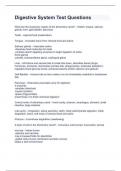
Exam (elaborations) Digestive System
Digestive System Test Questions What are the accessory organs of the alimentary canal? - /nteeth, tongue, salivary glands, liver, gall bladder, pancreas Teeth - /ngrinds food (mastication) Tongue - /ncreates bolus from chewed food and saliva Salivary glands - /nsecretes saliva -dissolves food molecules for taste -contains starch digesting enzymes to begin digestion of carbs three glands -parotid, submandibular gland, sublingual gland
- Exam (elaborations)
- • 3 pages •
Digestive System Test Questions What are the accessory organs of the alimentary canal? - /nteeth, tongue, salivary glands, liver, gall bladder, pancreas Teeth - /ngrinds food (mastication) Tongue - /ncreates bolus from chewed food and saliva Salivary glands - /nsecretes saliva -dissolves food molecules for taste -contains starch digesting enzymes to begin digestion of carbs three glands -parotid, submandibular gland, sublingual gland
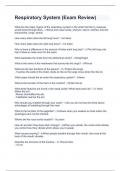
Exam (elaborations) Respiratory System
Respiratory System (Exam Review) What are the major organs of the respiratory system in the order that the 0₂ molecule would travel through them. - /nNose and nasal cavity, pharynx, larynx, trachea, bronchi, bronchioles, lungs, alveoli. How many lobes does the left lung have? - /n2 lobes How many lobes does the right lung have? - /n3 lobes Why is there a difference in the amount of lobes each lung has? - /nThe left lung only has 2 lobes to make room for the heart. What separates...
- Exam (elaborations)
- • 3 pages •
Respiratory System (Exam Review) What are the major organs of the respiratory system in the order that the 0₂ molecule would travel through them. - /nNose and nasal cavity, pharynx, larynx, trachea, bronchi, bronchioles, lungs, alveoli. How many lobes does the left lung have? - /n2 lobes How many lobes does the right lung have? - /n3 lobes Why is there a difference in the amount of lobes each lung has? - /nThe left lung only has 2 lobes to make room for the heart. What separates...

Exam (elaborations) Biology.
Biology - Test Questions The sum of all chemical processes that occur in an organism is called what? - /nmetabolism In all organisms, DNA contains what kind of information? - /ngenetic Basically, the biological term for "keeping things the same". - /nhomeostasis In what form of reproduction are offspring genetically the same as the parent organism? - /nasexual Most importantly, a hypothesis must be... - /ntestable
- Exam (elaborations)
- • 3 pages •
Biology - Test Questions The sum of all chemical processes that occur in an organism is called what? - /nmetabolism In all organisms, DNA contains what kind of information? - /ngenetic Basically, the biological term for "keeping things the same". - /nhomeostasis In what form of reproduction are offspring genetically the same as the parent organism? - /nasexual Most importantly, a hypothesis must be... - /ntestable
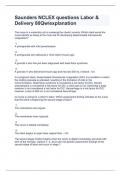
Exam (elaborations) Saunders NCLEX Labor & Delivery
Saunders NCLEX questions Labor & Delivery 80Qw/explanation The nurse in a maternity unit is reviewing the clients' records. Which client would the nurse identify as being at the most risk for developing disseminated intravascular coagulation? 1. A primigravida with mild preeclampsia 2. A primigravida who delivered a 10-lb infant 3 hours ago 3. A gravida II who has just been diagnosed with dead fetus syndrome 4. A gravida IV who delivered 8 hours ago and has lost 500 mL of...
- Exam (elaborations)
- • 41 pages •
Saunders NCLEX questions Labor & Delivery 80Qw/explanation The nurse in a maternity unit is reviewing the clients' records. Which client would the nurse identify as being at the most risk for developing disseminated intravascular coagulation? 1. A primigravida with mild preeclampsia 2. A primigravida who delivered a 10-lb infant 3 hours ago 3. A gravida II who has just been diagnosed with dead fetus syndrome 4. A gravida IV who delivered 8 hours ago and has lost 500 mL of...
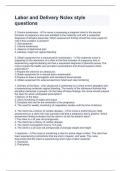
Exam (elaborations) Labor and Delivery Nclex style
Labor and Delivery Nclex style questions 2. Uterine tenderness - /nThe nurse is assessing a pregnant client in the second trimester of pregnancy who was admitted to the maternity unit with a suspected diagnosis of abruptio placentae. Which assessment finding should the nurse expect to note if this condition is present? 1. Soft abdomen 2. Uterine tenderness 3. absence of abdominal pain 4. painless, bright red vaginal bleeding 2. Obtain equipment for a manual pelvic examination. - /nThe ...
- Exam (elaborations)
- • 9 pages •
Labor and Delivery Nclex style questions 2. Uterine tenderness - /nThe nurse is assessing a pregnant client in the second trimester of pregnancy who was admitted to the maternity unit with a suspected diagnosis of abruptio placentae. Which assessment finding should the nurse expect to note if this condition is present? 1. Soft abdomen 2. Uterine tenderness 3. absence of abdominal pain 4. painless, bright red vaginal bleeding 2. Obtain equipment for a manual pelvic examination. - /nThe ...
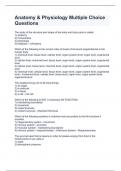
Exam (elaborations) Anatomy & Physiology Multiple Choice
Anatomy & Physiology Multiple Choice Questions The study of the structure and shape of the body and body parts is called: 1) anatomy 2) homeostasis 3) physiology 4) feedback - /nAnatomy Which of the following is the correct order of levels of structural organizational in the human body: 1) chemical level, tissue level, cellular level, organ system level, organ level, organismal level 2) cellular level, chemical level, tissue level, organ level, organ system level, organismal level ...
- Exam (elaborations)
- • 34 pages •
Anatomy & Physiology Multiple Choice Questions The study of the structure and shape of the body and body parts is called: 1) anatomy 2) homeostasis 3) physiology 4) feedback - /nAnatomy Which of the following is the correct order of levels of structural organizational in the human body: 1) chemical level, tissue level, cellular level, organ system level, organ level, organismal level 2) cellular level, chemical level, tissue level, organ level, organ system level, organismal level ...

Exam (elaborations) Chapter 1-4 Anatomy and Physiology Anatomy
Chapter 1-4 Anatomy and Physiology Anatomy - /nthe study of the structure of the body Physiology - /nthe study of the function of the body Chemical level - /nrepresents the atoms and molecules that make up cells (Consists of Atomic level and molecular level) Cellular level - /nrepresents the basic unit of all living things Tissue level - /na group of cells with similar or common function Organ level - /na group of tissues with similar or common function
- Exam (elaborations)
- • 55 pages •
Chapter 1-4 Anatomy and Physiology Anatomy - /nthe study of the structure of the body Physiology - /nthe study of the function of the body Chemical level - /nrepresents the atoms and molecules that make up cells (Consists of Atomic level and molecular level) Cellular level - /nrepresents the basic unit of all living things Tissue level - /na group of cells with similar or common function Organ level - /na group of tissues with similar or common function
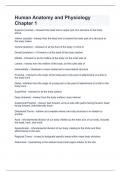
Exam (elaborations) Human Anatomy and Physiology Chapter 1
Human Anatomy and Physiology Chapter 1 Superior (cranial) - /ntoward the head end or upper part of a structure or the body; above Inferior (caudal) - /naway from the head end or toward the lower part of a structure or the body; below Ventral (anterior) - /ntoward or at the front of the body; in front of Dorsal (posterior) - /nToward or at the back of the body; behind
- Exam (elaborations)
- • 14 pages •
Human Anatomy and Physiology Chapter 1 Superior (cranial) - /ntoward the head end or upper part of a structure or the body; above Inferior (caudal) - /naway from the head end or toward the lower part of a structure or the body; below Ventral (anterior) - /ntoward or at the front of the body; in front of Dorsal (posterior) - /nToward or at the back of the body; behind
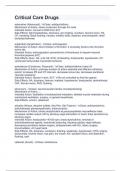
Exam (elaborations) Critical Care Drugs
Critical Care Drugs adenosine (Adenocard) - /nClass: antidysrhythmic Mechanism of Action: slows conduction through AV node Intended Action: convert to NSR from SVT Side Effects: light-headedness, dizziness, arm tingling, numbers, blurred vision, HA, CP, sweating, facial flushing, nausea, metallic taste, dyspnea, bronchospasm, atrial tachydysrhythmias argatroban (Argatroban) - /nClass: anticoagulant Mechanism of Action: direct inhibitor of thrombin, it reversibly binds to the thrombin...
- Exam (elaborations)
- • 10 pages •
Critical Care Drugs adenosine (Adenocard) - /nClass: antidysrhythmic Mechanism of Action: slows conduction through AV node Intended Action: convert to NSR from SVT Side Effects: light-headedness, dizziness, arm tingling, numbers, blurred vision, HA, CP, sweating, facial flushing, nausea, metallic taste, dyspnea, bronchospasm, atrial tachydysrhythmias argatroban (Argatroban) - /nClass: anticoagulant Mechanism of Action: direct inhibitor of thrombin, it reversibly binds to the thrombin...

RNSG 2201 _ Chapter 03: Hereditary Influences on Health Promotion of the Child
Exam (elaborations) NURS MISC _ CRITICAL CARE TestBank Exam 2
Summary NR226 EXAM REVIEWS (1)
Not what I expected
Summary NUR 2063 Essentials of Pathophysiology Exam 1 Blueprint
not the full document
Exam (elaborations) Nursing 274_Fluids and Electrolytes medsurge 1 (Latest exams download to get Aplus)